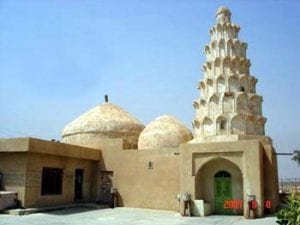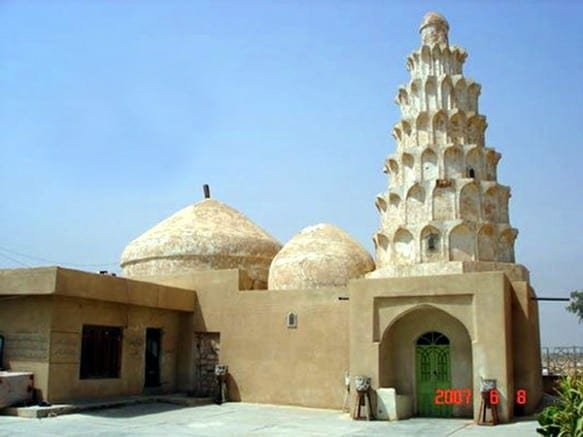Khawaja Imam Hasan of Basra RA
Sultan ul Faqr 2nd
Imam Hasan al Basri (may Allah be pleased with him) is the Sultan ul Faqr 2nd. The seed of Sufism is said to have existed from the beginning of human creation with the an-Nur of Prophet Mohammad. The origin of Sufism in the Sarwari Qadri order started with Prophet Mohammad. The real definition of Sufism is Faqr which is transferred by Prophet Mohammad. The status of Sultan ul Faqr is granted by the holy Mohammadan assembly.
Imam Hasan of Basra was first person after People of the Cloak (Ahl al-Bayt) who attained the extreme status of Faqr. He got a cloak (khirqah) of spiritual succession (khilafat) from Ali ibn Abi Talib. Thereafter, Ali also passed on the heritage of Divine knowledge of Prophet Mohammad and Trust of Faqr to him. Hence, he is the medium who transferred Faqr of Prophet Mohammad from People of the Cloak to Muslim umma. In other words, he transferred Faqr in Islam to Umma.

Hasan al Basri Biography
The patronymic name of Sultan ul Faqr 2nd Imam Hasan of Basra was Abu Mohammad, Abu Saeed, Abu Nasar, and also Abu Ali. His father’s name was Yasar who was a freed slave of Zayd ibn Thabit. While, name of his mother was Khaira and she was the maid of Prophet Mohammad’s wife Umm-e-Salma. Umm-e-Salma was Hasan’s foster mother as she fed him her milk and also brought him up.
Hasan of Basra was born in the caliphate of Umar ibn Khattab in 21 Hijri in Madina. Since birth he had an enlightened beauty. When he was brought to Umar for blessings, he said, “Name this child Hasan as he is very beautiful”. Also, Umar prayed for him, “O Allah bless him with perfect knowledge of Islam and make him beloved among people”. Allah granted his prayer and Hasan attained highest status in Faqr as well as in religious knowledge. This page showcase Hasan al Basri biography as Sultan ul Faqr 2nd in the Sarwari Qadri order.
EDUCATION
Al Hasan al Basri was brought up and educated among the sacred Companions of Holy Prophet. He also gained the exoteric as well as esoteric knowledge of Islam from the Companions. Particularly, from Ali ibn Abi Talib, Umar ibn Khattab, Usman ibn Affan, Anas ibn Malik and Hasan ibn Ali. He used to say, “I have had the privilege of seeing and meeting hundred and thirty Companions of Holy Prophet. Among them seventy were those who fought the battle of Badr”. Hence, the status of Sultan ul Faqr 2nd is highest amongst the Tabi’un (generation of Muslims who followed the Companions of Prophet Mohammad).
OATH OF ALLEGIANCE (BAYAT / AL-BAYAH)
The Sufi books Siyar-ul-Auliya and Sair-ul-Aqtab state about the oath of allegiance and spiritual succession of Sultan ul Faqr 2nd:
- Hasan of Basra took oath of allegiance at the hands of Ali ibn Abi Talib. Ali granted him special cloak and turban which Holy Prophet had granted him thus appointed him his superior spiritual successor. Also, he passed on complete knowledge of Divine secrets to Hasan, hence transferred the Trust of Faqr to him. Furthermore, Ali taught him the real method of invocation of Islamic creed (Kalma Tayyab) as Prophet Mohammad had taught him. That is, through negation of everything other than Allah (nafi) and verification by heart of His Essence (Asbat). Afterwards, Hasan introduced this method in the world of Islam.
Contribution of Sultan ul Faqr 2nd as Universal Divine Man
After getting the Trust of Faqr Hasan el Basri achieved the status of Universal Divine Man (al-Insan al-Kamil) of his era. Sultan ul Faqr 2nd then established a grand system of spiritual orders and mystic ways. This system spread in the whole Muslim world through his spiritual successors. It still exists and spiritual guides grant gnosis and closeness of Allah to true seekers following any of its chain. All the existing mystic orders trace back to Sultan ul Faqr 2nd and through him to Ali ibn Abi Talib. Specifically, the orders namely Qadiriya, Soharwardia, Chishtia, Nizamia, Rifa’iyah, Shadhiliya, Al-Maghribia and Kalabia trace back to Ali through Hasan. However, the Naqshbandi order reaches Abu Bakr Siddiq through Salman the Persian.
CONTROVERSY REGARDING HASAN’S ALLEGIANCE TO ALI
Although, all Sufis and Saints unanimously accept that every spiritual order reaches Ali ibn Abi Talib through Hasan of Basra. Yet some scholars and traditionalists disagree upon the fact that Hasan ever met Ali or heard any Hadith from him. The reason for this disagreement is that these scholars could not find any Hadith which Sultan ul Faqr 2nd had related from Ali. He never quoted the name of Ali ibn Abi Talib while narrating a Hadith. From this they conclude that Sultan ul Faqr 2nd never met Ali. If we accept the argument of these scholars, then the whole system of spiritual orders and mystic ways collapse. Because if Hasan of Basra never met Ali, neither took oath of allegiance on his hands nor got cloak of succession and Trust of Faqr from him than how could all the orders reach from him to Ali and then to Prophet Mohammad?
Hasan of Basra is the main link which connects every Sufi order to Ali ibn Abi Talib and Prophet Mohammad. If this link is not there, it becomes questionable that through whom Divine knowledge of Prophet Mohammad was transferred to umma. The circumstances and evidences also prove that it is not possible that Sultan ul Faqr 2nd never met Ali.
EVIDENCE AGAINST THE CONTROVERSY
Sultan ul Faqr 2nd Hasan of Basra was born in 21 Hijri in the caliphate of Umar ibn Khattab in Madina. He remained in Madina till the caliphate of Ali ibn Abi Talib. Afterward, in 37 Hijri Ali shifted to Kufa on completing two years of his caliphate. Hasan also left Madina and relocated to Basra in the same year. Hence, both remained together in Madina for about sixteen years. Sultan ul Faqr 2nd had lived in Madina amongst the Companions from childhood till youth. He must have met most of them and offered prayer with them five times every day in Masjid al-Nabwi. Moreover, during the caliphate of Ali he remained in Madina for at least two years. Thus, he must have offered prayers behind him and listened to his sermons. Then how is it possible that Sultan ul Faqr 2nd never met Ali ibn Abi Talib or never heard any Hadith from him or never had his spiritual companionship!
EVIDENCE GIVEN BY GREAT IMAMS
Tahdhib al-Kamal is an authentic work on biographies of 8640 narrators of Hadith including the Companions. Its compiler Imam al-Miz’zi states, “When Usman was martyred, Sultan ul Faqr 2nd Hasan of Basra was present there. He was about fourteen years of age at that time.” All scholars of Hadith accept this fact. Yet they question; if Hasan had listened Hadiths from Ali then why he hadn’t related any Hadith with his name.
To answer this question, Imam al-Nasai, Imam al-Suyuti, Imam al-Miz’zi and many other great Imams did much research. After some hard work they found few Hadiths which Hasan of Basra had stated with the name of Ali. Moreover, they also found an important statement of Sultan ul Faqr 2nd regarding narration of Hadith by him. The statement explains why he related Hadiths directly to Prophet Mohammad even when he had not heard it directly from him. As Sultan ul Faqr 2nd Hasan of Basra was born after death of Prophet Mohammad, he heard the Hadiths from Prophet’s Companions. While narrating the Hadith which he had heard from any Companion other than Ali, he stated the Companion’s name. But there are some Hadiths which Sultan ul Faqr 2nd related directly from Mohammad without mentioning the name of any Companion.
THE STATEMENT
Imam Miz’zi states in Tahdhib al-Kamal:
- Younas ibn Obaid said that once he asked Hasan, “While narrating a Hadith why do you say ‘Prophet Mohammad said?’ Although you have not found his sacred company and have not listened Hadith directly from him”. Sultan ul Faqr 2nd replied, “O nephew you have asked me a question which nobody has ever asked me before. If you were not special to me, I would not have answered this question. Infact every Hadith before narrating which I say ‘Holy Prophet said’ I have actually heard from Ali. But the age in which we are living is such that I cannot openly take name of Ali.” (Tahdhib al-Kamal book 4, page 124).
WHY SULTAN UL FAQR 2nd COULD NOT TAKE NAME OF HAZRAT ALI IBN ABI TALIB
It was the time of Ummayad caliphate when Al-Hajjaj ibn Yusuf ruled. Ummayads were against Ali, whoever took his name praisingly was punished badly and was banned to give sermons. Ali had to face great opposition and enmity from Ummayyads and the Kharijites since the beginning of his caliphate. He could foresee that they would either kill his companions, friends and disciples or prohibit them to take his name. Sultan ul Faqr 2nd Hasan of Basra was destined to preserve and promote the real knowledge of Islam i.e. gnosis and vision of Allah. If Ummayads had killed him or banned his sermons, it would have become impossible to spread this knowledge.
Thus, Ali must have instructed him not to take his name while narrating a Hadith, just to be careful. Moreover, to avoid enmity with rulers so that he could do his duty secretly and easily without any chaos. The silence of Sultan ul Faqr 2nd about Ali gave the impression to enemies that he had no relation with him.
HADITHS BY SULTAN UL FAQR 2nd RELATED FROM ALI
Though, some scholars could not find Hadiths that Hasan related from Ali. But this does not prove that such Hadiths do not exist. They could not find them due to their own lack of research. However, the scholars who sincerely and painstakingly searched such Hadiths surely found a few. Some of these Hadiths with authentic references are given below:
- Ahmad ibn Hanbal quotes in Musnad, “Hasheem stated that he heard from Yousuf that he heard from Hasan of Basra that he heard from Ali that Prophet Mohammad said that Allah has exempted three persons; a boy unless he matures, a sleeping person unless he awakes and a lunatic unless he returns to his senses”. Tirmidhi has also quoted this Hadith with the same chain of narrators. Nisai and Hakim have confirmed its authenticity.
- Imam Nisai states, “Ali ibn Hajr has told us that Yazid ibn Harun quoted from Hameed who heard from Sultan ul Faqr 2nd Hasan of Basra that Ali said that Prophet of Allah said, ‘When Allah blesses you with His Divine favour then you must show generosity and give a bowl of wheat or the like as charity’.”
FURTHER EVIDENCE
Imam al-Suyuti has written a booklet with the title Itehaf al-Firqah Bavasul al-Khirqah. In this booklet he has proved that Sultan ul Faqr 2nd took cloak of spiritual succession from Ali.
Shah Waliullah Dehlawi had a dialectic with Shah Fakharuddin Dehlawi over this controversy which continued for three days. Fakharuddin gave evidences to prove the meeting between Ali and Hasan of Basra while Shah Waliullah gave arguments against it. To prove his point, Fakharuddin collected thirty five such Hadiths which Hasan had quoted with the name of Ali. For brevity, we give a few references below;
- Ibn Majah, Al-Sunan, Kitab al-Jihad– volume II, page 922, Hadith 2761.
- Musnad Ahmad ibn Hanbal – volume I, page 140, Hadith 1183.
- Imam Nisai, Kitab Al-SunanAl-Kubra – volume II, page 222, Hadith 3161.
GRANDEUR OF Sultan ul Faqr 2nd HASAN OF BASRA
Al Hasan al Basri quotes are nothing less than Divine knowledge as he is the leader and master in exegesis of Quran and Hadith. He was not only proficient in all branches of knowledge but was also extremely pious and devoted towards mystic practices. Sultan ul Faqr 2nd used to fast for seven consecutive days. Traditions state that he never remained without ablution. He mostly lived in seclusion and kept weeping due to the extreme fear of Allah. Except giving sermon once a week he did not like to meet people or attend gatherings.
The sermons of Sultan ul Faqr 2nd were usually about gnosis, vision and union of Allah. He discussed the diseases of innerself (nafs) and worldly temptations which prevent a Muslim from closeness of Allah. So that people may abstain from them. Large number of people gathered to listen to his sermons which also included the scholars and Saints of that time. Rabia of Basra, the great female Saint also attended the sermons of Sultan ul Faqr 2nd and gained spiritual knowledge from him.
Imam al-Baqir said, “Hasan’s speech resembles the speech of Prophets”.
Bilal ibn Abi Barda said, “I haven’t seen anyone resembling the Companions of Holy Prophet more than Hasan of Basra”.
Once someone asked a Saint, “Why Hasan of Basra is superior to us?” He answered, “All of you need his knowledge but he does not need anyone except Allah”. (Azala-tul-Khulafa, volume III)
SPIRITUAL SUCCESSION
Hasan of Basra granted spiritual succession to many of his disciples. Most famous among them are Shaikh Abdul Waahid bin Zaid and Shaikh Habib al-Ajmi. Fourteen spiritual orders started from these two disciples of Sultan ul Faqr 2nd. Five orders namely Zaidiyyah, Ayyazia, Adhmia, Hibiria and Chishtia started from Shaikh Abdul Waahid bin Zaid. While nine orders namely Ajmia, Taifuria, Karkhia, Saqtia, Junaidia, Gazronia, Tusia, Soharwardia and Firdausia originated from Shaikh Habib al-Ajmi. Sultan ul Faqr 2nd Hasan of Basra passed on the Trust of Faqr to Shaikh Habib al-Ajmi.
Death of Sultan ul Faqr 2nd
Hasan of Basra died on Friday, 4th of Muharram in 111 Hijri (8th April, 729). It was the reign of Hisham ibn Abd al-Malik ibn Marwan. The tomb of Sultan ul Faqr 2nd is in Basra.

